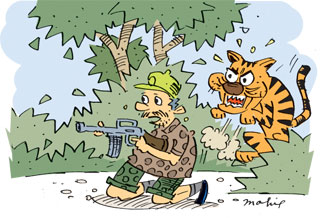|

by R. S. Karunaratne
Adverbs of time and frequency
Adverbs of time are of two types:
1. Adverbs of definite time
2. Adverbs of indefinite time
Adverbs of definite time
Adverbs of definite time indicate the exact time when something takes
place. They can be used at the beginning or end of the sentence.
Yesterday we went to Nikaweratiya.
|

A tiger sprang suddenly on the hunter |
Now is the time to act.
Tomorrow the councillors will meet for the first time.
We must hold the meeting now.
The farewell party will be held today.
Shall we meet tomorrow?
Are you coming home tonight?
Adverbs of indefinite time
Adverbs of indefinite time do not indicate the exact time when
something takes place. They are also used at the beginning or at the end
of a sentence.
Those who come late were not able to buy tickets for the show.
He reminded me again to bring the pocket dictionary.
I met Ajith at the Public Library recently.
Sirimanne died suddenly.
I dialled the number again but there was no response.
Adverbs of indefinite time are sometimes used between the subject and
the main verb.
The couple recently moved into a new apartment.
She again called me to join her.
Rama suddenly fell ill.
Adverbs of indefinite time are also used after a ‘be’ verb or a main
verb.
A tiger sprang suddenly on the hunter.
The director came late for the staff meeting.
Adverbs of frequency indicate how often something takes place. They
can be used at the beginning of a sentence or at the end.
Sometimes I go to church on Sunday.
I used to argue with him quite frequently.
When do you usually go for lunch?
German tourists visit Sri Lanka very often.
|

The Principal has already left office. |
Adverbs of frequency are used between the subject and the main verb
or after a ‘be’ verb.
Mary usually eats in the canteen.
Cyril is never late for work.
I often write to my friends in the United States.
They are usually late comers.
He often gets into a rage.
We use adverbs of indefinite time or adverbs of frequency in between
two verbs.
The Principal has already left office.
My grandmother has rarely been to Colombo.
The street vendor is still selling his wares.
The train had already left when we arrived at the station.
Sam has never invited his relatives for his birthday parties.
[Activity]
Use the adverbs given in brackets in the correct position. Check your
answers with the key.
1. I met my former mathematics teacher in Kandy. (yesterday)
2. We have elected a new chairman. (now)
3. Some roads in Colombo will be closed for the Navam Perahera.
(tonight)
4. The best student was praised for his brilliant performance. (again)
5. The principal has warned the teacher for her late attendance.
(already)
6. I watch television on weekdays. (seldom)
7. The students came for the sports meet. (early)
8. I was frightened by the lion in the cage. (suddenly)
9. The clerk has been promoted as a manager. (just)
10. Father advised me to learn English. (often)
[Key]
1. I met my former mathematics teacher in Kandy yesterday.
2. Now we have elected a new chairman.
3. Tonight some roads in Colombo will be closed for the Navam Perahera.
4. The best student was praised again for his brilliant performance.
5. The principal has already warned the teacher for her late attendance.
6. I seldom watch television on weekdays.
7. The students came early for the sports meet.
8. Suddenly I was frightened by the lion in the cage.
9. The clerk has just been promoted as a manager.
10. Father often advised me to learn English.

An enriched vocabulary helps you to express yourself effectively.
Here is an interesting quiz to test your vocabulary and enrich it.
Indicate the correct meaning for the words in bold type. Check your
answers with the key.
1. In the past claustrophobia was an individual’s problem; today it
is societal.
(a) abnormal fear of being in closed spaces
(b) abnormal fear of heights
(c) abnormal fear of dogs
2. When Lal was bitten by a stray dog he feared that he might develop
hydrophobia.
(a) fear of cats
(b) rabies
(c) fear of fire
3. Moral decay has turned him into a misanthrope.
(a) one who hates children
(b) one who hates women
(c) one who hates mankind
4. Vilified by most women in the village he turned out to be a
misogynist.
(a) one who hates women
(b) one who dislikes butterflies
(c) one who loves children
5. I am not interested in philately although it is a profitable
pastime.
(a) western music
(b) collection of stamps
(c) doll-making
6. The ‘One World’ philosophy will one day make xenophobia extinct.
(a) fear of spiders
(b) fear of foreigners
(c) fear of crocodiles
7. Cardiology has made vast strides with open-heart surgery and
pacemakers.
(a) medical study of the brain
(b) medical study of the lungs
(c) study of the diseases and functions of the heart
8.Marilyn Monroe projected a meretricious quality which led to
depression.
(a) ignorant
(b) false alluring
(c) genuine
9. The detective walked towards the suspect in a nonchalant way
trying not to arouse his suspicion.
(a) simple
(b) arrogant
(c) indifferent
10. Like Shylock he remained obdurate when I asked for mercy.
(a) indifferent
(b) kind-hearted
(c) hard-hearted
Key:
1. (a) 2. (b) 3. (c) 4. (a) 5. (b) 6. (b) 7. (c) 8. (b) 9. (c) 10.
(c) |

